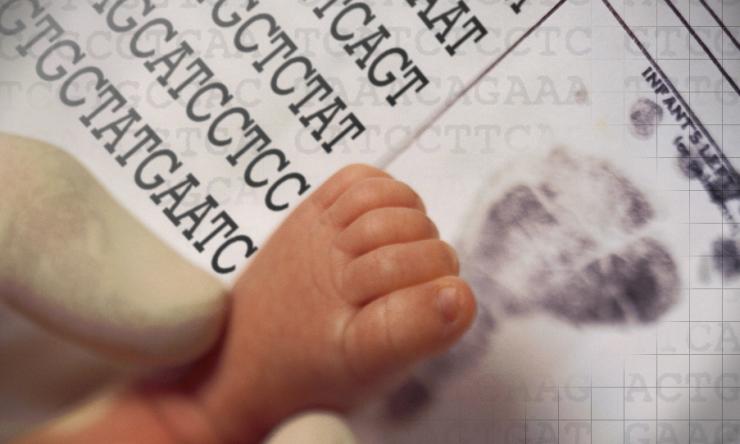Genomic sequencing of healthy newborns does not disrupt family dynamics
Genome sequencing can reveal insights into a person’s risk for specific health conditions throughout their lifetime. Some believe these tests should be performed on all newborns at birth to address disease risk early in life, while others have concerns about this approach, including that the information may cause undue distress for families.
As part of the BabySeq Project, researchers led by a team from Baylor College of Medicine, Harvard Medical School, Brigham and Women’s Hospital and Boston Children’s Hospital studied the psychosocial impact of integrating genome sequencing into the clinical care of newborns. The results, published today in the journal JAMA Pediatrics, showed no negative impact on families during the infant’s first year of life as a result of genome sequencing, even if monogenic disease risk or carrier status findings were returned to families.
The BabySeq Project is a first-of-its-kind randomized clinical trial designed to examine how best to use genomics in clinical newborn medicine. The study enrolled 325 infants and families from well-baby nurseries and newborn intensive care units at academic hospitals in Boston. Half of the newborns were assigned to a control arm and received the standard state-mandated newborn screening along with a family history report. The other half received the same screening and report, plus whole exome sequencing with comprehensive interpretation and return of nearly 1,000 genes. The sequencing looked for variants related to genetic risk for childhood-onset conditions, as well as a few highly actionable adult-onset conditions. Parental DNA also was sequenced to determine if the variants were inherited.
The JAMA Pediatrics study focused on the psychosocial effects of that testing by looking at the impact on the parent-child relationship, parent psychological distress and the parents’ relationship with each other. Parents completed surveys measuring those domains for about a year and a half after birth. Although minor differences between the study arm and the control arm appeared at different points, the results did not show meaningful differences in family impact over time. Researchers also found lower self- and partner-blame in the study arm compared to the control, possibly because sequencing information provided some degree of peace of mind.
“Prior studies suggest that adults don’t usually experience negative psychological impact when given genomic information about themselves; but how this impacts parents and the family unit when the information is about their newborns hadn’t been previously explored,” said Dr. Stacey Pereira, assistant professor at the Center for Medical Ethics and Health Policy at Baylor and co-first author of the study with Dr. Hadley Smith, also with the Baylor center. “We are proud that our work helps provide a more complete understanding of the impact of newborn genome sequencing.”
“This study is unique in that it looks, in part, at genetic risk for seemingly healthy babies,” said Dr. Amy McGuire, corresponding author of the study, co-principal investigator of the BabySeq Project and Leon Jaworski Professor of Biomedical Ethics and director of the Center for Medical Ethics and Health Policy at Baylor. “Some are concerned that parents who know that their seemingly healthy child is at risk for disease later in childhood or adulthood will experience more anxiety or alter how they relate to their child. The lack of distress on the family unit is an encouraging sign as we continue to explore the potential risks and benefits, as well as ethical and equity questions related to preventive sequencing of apparently healthy people.”
The researchers point out that their study consists of volunteer participants mostly of European descent and from affluent, educated families. This volunteer group may be more open to receiving genetic information. Next, the BabySeq Project team will seek to expand their study to a larger and more diverse population. The researchers also want to follow families for a longer period of time to capture long-term impacts.
“We are collecting the first robust data on incorporating genome sequencing into routine newborn care,” said Dr. Robert C. Green, study author, principal investigator of BabySeq, professor of medicine at Harvard Medical School and medical geneticist at Brigham and Women’s Hospital. “We have now shown that this information can be medically beneficial through early intervention and is not disruptive to the parent-infant relationship, and our ongoing analysis is measuring economic effects of genome sequencing. This type of research is critical to determine best practices for preventive genomic healthcare throughout the lifespan.”
The BabySeq Project is part of the Newborn Sequencing In Genomic medicine and public HealTh, (NSIGHT) Consortium, which was granted $25 million over a five-year period by the National Institute of Child Health and Human Development and the National Human Genome Research Institute to gather critical research on newborn sequencing. Dr. Alan H. Beggs of Boston Children’s Hospital serves as principal investigator along with Green. For a full list of contributing authors and funding for this study, see the publication.







 Credit
Credit


